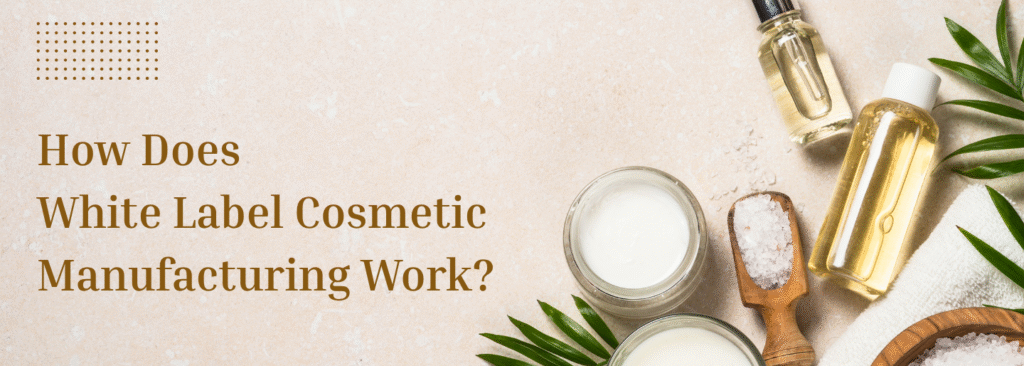How Does White Label Cosmetic Manufacturing Work?

The demand for customization, innovation, and efficiency at an affordable cost is growing in the cosmetic industry. The brands that aim to launch the new products for their customers without undergoing in-house production can use the White Label Cosmetic Manufacturing. The White Label Cosmetic Manufacturing is the right solution for such brands.
The White Label Cosmetic Manufacturing process supports the business to bring customized and premium products to markets quickly. It also allows them to launch new products at an affordable cost. Let us tell you how the white label cosmetic manufacturer works, the advantages of partnering with Fortune International, etc, in this guide.
What is White Label Cosmetic Manufacturing?
The White Label Cosmetic Manufacturing is a process in which manufacturers produce the premium and generic cosmetic products. It allows the businesses to rebrand the products and customize them. These products are formulated and tested carefully and meet safety and quality standards. This manufacturing prepares the products ready for branding and distribution. The key features of this manufacturing are
- Pre-developed products: This model gives you tried and tested beauty products to deliver to customers with quality
- Custom branding: The white label manufacturers in India allow businesses to apply their packaging designs, unique logos, and marketing materials to cosmetic products. But white labeling allows you less customization than cosmetic private label manufacturers.
- Fast market entry: The white labeling gives you pre developed products, and allows you to launch the products quickly in the market.
How does White Label Cosmetic Manufacturing work?
Here how does the white labeling process works
- Pick from the range of cosmetic products. The cosmetic product manufacturing company helps you to select the beauty products, including haircare, skincare, balms, oils, creams, serums, etc.
- Customize your collection. Choose the best cosmetic products that fit your customer’s needs and brand.
- Choose from several options of packaging, and customize the colors, finishes, labels, etc.
- Now, the manufacturer ensures that the products are aligned with quality standards.
- Once all elements are validated, the white labeling manufacturing starts. You get final products, and are ready to sell under your brand name to customers.
Why partner with the White Label Cosmetic Manufacturers in India
Working with reputable White Label Cosmetic Manufacturers, like Fortune International helps you to expand your product range, customize the beauty products as per your customers and brand, and sell them in the market. Here are more reasons for partnering with the cosmetic manufacturers
- Save time
Manufacturing the new products is a long process, because it involves production, research, formulation, testing and distribution. The reliable White Label Cosmetic Manufacturers help you to distribute products directly to markets and save time.
- Reduce investment
Setting up the white labeling Cosmetic Manufacturing plants need a lot of capital investment in materials, tools, and human resources. But if you partner with Fortune International, it reduces capital investments and saves your costs.
- Focus on branding
As the White Label Cosmetic Manufacturing process is assigned to experts, brands can easily allocate their efforts to marketing, sales, and branding. It is a more effective process to create brand image and build customer loyalty.
- Access to expertise
The manufacturers know the formulation and development of cosmetic products. It helps businesses to get expertise access and create premium products.
- Scalability
This manufacturing process provides benefits to brands to produce many cosmetic products under their brand names. It also allows them to directly launch products in the market or launch a series of products.
Conclusion
New trends in the cosmetic sector make it more evolving and enhance customer demands. This is why the companies are looking for the best White Label Cosmetic Manufacturers to collaborate. These manufacturers produce efficient and affordable products, and allows the companies to customize it with brand logos and develop premium and unique products for customers.
The White Label Cosmetic Manufacturers describes the process and has expertise in this industry. They own natural resources, a developed manufacturing sector, and production affordability. So, choosing the right White Label Cosmetic Manufacturing helps the brands to enhance their designing appeal for customers, build satisfied results, and boost their brand image.
FAQs
Q. How does the White Label Cosmetic Manufacturing work?
Ans. The White Label Cosmetic products Manufacturing process consists of a selection of ready products, customized in terms of packaging and branding, and then delivers final cosmetic products to customers. It allows companies to launch the products quickly without investing in their own manufacturing facilities.
Q. How do you white label beauty products?
Ans. To white label the beauty products, you should find a reliable manufacturer that allows you to buy pre-developed products and also provides white labeling services. Then, you and manufacturers collaborate on the same stage, work on branding and packaging of products, and allow you to launch customized products in the market.
Q. What are the advantages of white label manufacturing?
Ans. The benefits of White Label Cosmetic Manufacturing process are reduced costs, access to expert manufacturers, fast market access, and more focus on branding rather than manufacturing. It makes it suitable for startups and established brands who want to gain success in the cosmetic industry.
Q. How long does it takes to create white label beauty product?
Ans. The white labeling takes 4-8 weeks, on the basis of production schedules and customization.
